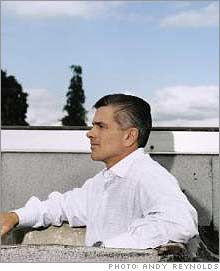|
Wall Street courts Main Street A Seattle M&A firm offers white-glove service to small businesses.
SEATTLE (FSB Magazine) -- Wall Street loves small business - in theory. Ask any investment banker. Small business is the engine of the nation's economy, the vital cog in the machinery of capitalism. Just don't show up at that banker's office hoping for help on a deal.
Suddenly the banker needs to take an important call from that big client, the one whose fees pay for the second home in Aspen. And that's when your deal becomes a chew toy for some apple-cheeked apprentice fresh from the Ivy League. Understandably, there's a lot of simmering resentment among small-business folk, and that has created a nifty market niche for a boutique investment bank called Cascadia Capital. Cascadia offers small and midsized firms what they usually can't get from a Morgan Stanley or a Goldman Sachs: lavish service and lower fees. "Small business is paying for the A team and getting the B team from the big banks on Wall Street," argues Michael Butler, CEO and co-founder of Cascadia. "Those bankers won't get out of bed for less than $2 million to $3 million in fees." Cascadia's fees are typically $500,000 to $750,000. As a result, Butler, 45, and his 21 bankers have been involved in some of the most talked-about deals of the past two years. Among their clients: Nighthawk Radiology Services (Charts), Lightwave Electronics, and QPass. This year, Butler expects Cascadia to post revenues of about $15 million, triple what it reported in 2001. Still, Butler says, he has to fight hard for new business. Many small-business owners have a bias against boutiques, worrying that they lack the clout to attract the top investors or negotiate the best terms on a deal. Plus, although cheaper than the big firms, they still can be expensive. Cascadia recently scored a coup, snagging a client that bigger rivals had been courting for years. Butler helped sell Lenel International in Rochester, N.Y., to United Technologies (Charts) for $440 million. Founded in 1990 by a couple who had emigrated from Russia, Lenel was a stealth star of the security-systems industry-until 9/11, when security instantly became a top priority. Suddenly Lenel found itself being wooed by big-league Wall Street bankers eager to arrange a merger. "They were young and cocky, and they didn't know anything about us or our business," Lenel president Elena Prokupets recalls. "I speak with an accent, and I am a blond, so they treated me like a stupid woman and focused only on my husband." (Elena and Rudy Prokupets are both electrical engineers, graduates of St. Petersburg State Poly-technical University, the MIT of Russia.) "We were also suspicious that these bankers would use our little company to please their big clients," she says. "Maybe they would sell us at a bargain price to GE. Too bad for us, but good for GE." Cascadia's Butler didn't have big clients to please. He also had a different approach: a 55-slide presentation to the couple on the state of the security industry, with detailed analyses of the market. Butler also estimated the company to be worth $400 million, 50% higher than the valuations offered by his competitors, and he was sensitive to the couple's desire to protect loyal employees if the company were sold. Butler has an advantage over his rivals on Wall Street: He thinks like an entrepreneur because he is one. He spent 15 years on Wall Street as a banker, first at Morgan Stanley, then at Lehman Brothers. In 1999, he quit and moved back to his hometown, Seattle. There he launched Cascadia, figuring he'd cash in on the then-bustling M&A market on the West Coast. Months later the market tanked, and most of the boutiques were gobbled up by big investment banks. He spent the next three years desperately trolling for deals, until business started to pick up in 2002. Success has spawned competition. Recently a new crop of investment-banking boutiques, including Lane Berry of Boston and Think Equity of San Francisco, have sprung up to cater to small and midsized businesses. Butler, though, isn't worried about his new regional rivals. Says he: "There's plenty of business for all of us." ----------------------------------------- Next: The time to sell is... now! Do you think boutique investment banks are a good option for small businesses? Tell us what you think. |
|

